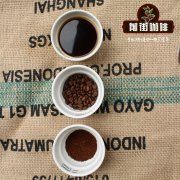How about Cameroon Coffee? Cameroon Java long beans

Professional coffee knowledge exchange more coffee bean information please follow the coffee workshop (Wechat official account cafe_style)
Cameroon has the characteristics of soil quality, climate and topography, which is suitable for the growth of many kinds of crops. The main crops are coffee, cocoa, cotton and other cash crops and millet, sorghum, corn and other food crops. Cameroon is rich in Rob Coffee Raw beans.
Rich volcanic soil, high altitude, moderate rainfall-all of these make Cameroon an ideal place to grow good coffee and is the main producer of world-famous premium coffee. Cameroon coffee has a mellow, earthy, chocolate-flavored silhouette and a plump polish with hints of red berries. The quality and characteristics of Cameroon coffee is similar to that of coffee from South America. Flavor: the palate is rich and soft, with low acidity. The products are graded according to the particle size, and the order from large to small is GG,G1,G2,G3,G4.
The Cameroon Capulami Cooperative, founded in 1958, learned coffee cultivation techniques and grown this excellent Jiawa coffee from coffee experts in Kenya, Tanzania and Rwanda; Cameroon's total export volume of coffee is equivalent to 1.5 million bags. Of these, 80% are Robbda seeds, and 20% Arabica coffee is mainly exported to Germany and France. The Arabica species of Cameroon was introduced by the Germans in 1905. Its provenance is said to be the same as Java coffee and Blue Mountain coffee. To be sure, it is the former Arabica coffee grown in an agricultural proving ground called Dschang. In the western highlands, it has spread widely in the surrounding areas because farmers use tin cards.
But the coffee industry in Cameroon collapsed from the second half of the 1980s to the mid-1990s, and the fall in coffee prices and the abolition of government aid to agriculture led farmers to give up growing coffee for about a decade. Farmers have resumed the cultivation of coffee as a sustainable crop, and coffee production has been gradually restored by pure natural farming without government assistance.
Cameroon Java long bean
[original name]: Cameroon UCCAO Caplami Java
[variety]: Java Java Arabica species
[growth altitude]: 5000 ft
[raw bean treatment]: half-washed Semi-Washed Process
[Origin]: West Africa-Western Cameroon Plateau
[producing areas / manors / cooperatives]: UCCAO Caplami Cooperative
[label]: UCCAO Caplami Cooperative
[grade]: Grade 1
[appearance]: 18 screen long beans
Important Notice :
前街咖啡 FrontStreet Coffee has moved to new addredd:
FrontStreet Coffee Address: 315,Donghua East Road,GuangZhou
Tel:020 38364473
- Prev

How much is the price of Blue Mountain Coffee in Japan
Professional coffee knowledge exchange more information about coffee beans Please follow the coffee workshop (Wechat official account cafe_style) Dishan Coffee production site, which gets its name from Langshan in the environment of the Caribbean. The sour, sweet and bitter taste are all very sour, sweet and bitter, and there are also "good" taste and fragrant taste. It is suitable for medium roasting to make a single coffee. The mountain is located in the Jamaica section, because
- Next

Cote d'Ivoire Coffee Cote d'Ivoire Coffee How about Cote d'Ivoire Coffee Bean Flavor
Professional coffee knowledge exchange More coffee bean information Please pay attention to coffee workshop (Weixin Official Accounts cafe_style) In terms of quantity, it is one of the largest producing countries in the world. Cote d'Ivoire never produces the best quality coffee, and very little coffee comes from the arabica tree. In the early 1980s, it was the third largest coffee producer in the world.
Related
- Detailed explanation of Jadeite planting Land in Panamanian Jadeite Manor introduction to the grading system of Jadeite competitive bidding, Red bid, Green bid and Rose Summer
- Story of Coffee planting in Brenka region of Costa Rica Stonehenge Manor anaerobic heavy honey treatment of flavor mouth
- What's on the barrel of Blue Mountain Coffee beans?
- Can American coffee also pull flowers? How to use hot American style to pull out a good-looking pattern?
- Can you make a cold extract with coffee beans? What is the right proportion for cold-extracted coffee formula?
- Indonesian PWN Gold Mandrine Coffee Origin Features Flavor How to Chong? Mandolin coffee is American.
- A brief introduction to the flavor characteristics of Brazilian yellow bourbon coffee beans
- What is the effect of different water quality on the flavor of cold-extracted coffee? What kind of water is best for brewing coffee?
- Why do you think of Rose Summer whenever you mention Panamanian coffee?
- Introduction to the characteristics of authentic blue mountain coffee bean producing areas? What is the CIB Coffee Authority in Jamaica?

